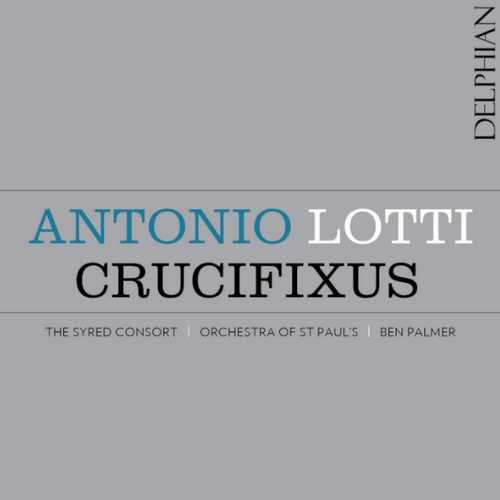
Performer: The Syred Consort
Orchestra: Orchestra of St. Paul
Conductor: Ben Palmer
Format: FLAC (tracks)
Label: Delphian
Release: 2016
Size: 826 MB
Recovery: +3%
Scan: yes
01. Dixit Dominus in G minor
Miserere in C minor
02. Miserere mei deus
03. Quoniam iniquitatem
04. Auditui meo
05. Cor mundum crea
06. Quoniam si voluisses
Missa Sancti Christophori
07. Kyrie
08. Gloria
09. Credo – Crucifixus
10. Sanctus
11. Benedictus
12. Agnus Dei
Credo in G minor
13. Credo in unum deaum
14. Et incarnatus est – Crucifixus
15. Ritornello – Et in Spiritum
16. Et unam sanctam 02:16
This Delphian label release uses the title of Antonio Lotti’s most famous composition, the Crucifixus à 8 heard here on track nine and performed by choirs great and small who love it for its simple, rich chains of dissonances. The booklet explains how this work, and a companion Crucifixus à 6, became well known while the rest of Lotti’s music was forgotten. But the Syred Consort and the Orchestra of St. Paul’s, with conductor Ben Palmer, focus instead on just those forgotten works; nothing on the album other than the two Crucifixus settings has ever been recorded before. The recording is worthwhile for that reason alone; the music Lotti wrote for performance at St. Mark’s Cathedral in Venice was past its prime by the early 18th century, but still significant. Lotti, in fact, was the teacher of the highly original Czech composer Jan Dismas Zelenka, who assembled some of Lotti’s compositions into larger wholes. The music here is never boring even if it never coheres into a single creative statement. Lotti writes sober fugues, heavily orchestrated quasi-operatic choruses, and most strikingly, bouncy melodic material that shows just how much progress the pre-Classical galant style had made by the second quarter of the 18th century. Sample the early movements of the Missa Sancti Christophori (tracks seven through 12) for music that sounds like it was written 50 years later than it was. It’s also fascinating to hear the St. Mark’s architecture applied to music other than Gabrieli’s and Monteverdi’s, as Lotti at times clearly does. The 13-person choir size of the Syred Consort is just right, judging from a 1766 Canaletto painting of the St. Mark’s choir, and the sometimes dense strands of the music weave together clearly. One may decline to accept the annotator’s suggestion that Lotti is right where Vivaldi was a half-century ago, and yet affirm that the album is of considerable interest for lovers of 18th century music.



